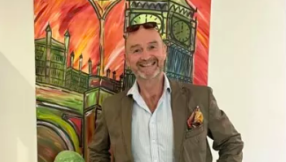Brave Youth Rally Together to Fight AIDS/HIV amid Darfur Violence
A group of young people have taken it as their commission to educate and tell others about HIV/AIDS in an effort to reduce the spread of the disease. Their campaign will target camps for internally displaced persons (IDPs), at university, amongst their friends and relatives, and at social gatherings.
Church World Service reveals that many of the inhabitants have not seen any armed attacks with their own eyes, but with IDP camps on the outskirts of town, and with many of their relatives victims of the conflict, the fighting is clearly apparent.
"My family has been affected," reports Mohammed, a 26-year-old student at Nyala University. "My relatives in Labado fled to Nyala. They told us that people with guns came to their homes, set fire to houses and shops, and killed many people."
"My aunt in Gereida was shot, the whole village looted by armed militias, and my father had all his cattle stolen," states Amani, also 26.
|QUOTE|"Last week in Otash camp, new arrivals from Buram area told me how they had been attacked by armed militias," she continues. "And I brought the wounded from Mershing back to Nyala," adds Hannan, according to CWS.
Like many other people in Nyala, Amani, Amira,and Hannan all work for humanitarian organisations. Through their work they regularly meet victims of the conflict. "This war has destroyed so much; there are many victims," laments Amira.
These young people want peace. "As a Sudanese, in particularly a Darfurian, I do not want the conflict to continue. I hope that it will end quickly and that there will be a comprehensive peace," declares Amani.
With or without peace, they know that there is something else which is also a great threat to the society in the region: "HIV/AIDS could destroy the community," declares Rhama, 26.
Mohammed, Amani, Hannan, Rhama, and Amira, along with others, all attended a six-day workshop and training session about HIV/AIDS and how to raise awareness and spread messages among others. The course was run by the Sudan Council of Churches (SCC), a member of ACT International and partner of ACT/Caritas.
Action by Churches Together International (ACT) - of which Church World Service is a member - and Caritas Internationalis (CI) are working together in a joint response to the Darfur crisis.
|AD|"The conflict has increased the risk of HIV/AIDS in our community -- through attacks on women, families being separated, and children and young people losing parents so they have nobody to care for them and tell them how to behave," explains Amani.
"Because people do not have information about HIV/AIDS, they put themselves at risk," adds Hannan.
"Before attending SCC's course, we had heard about HIV/AIDS but we didn't know what it was," says Amani. "SCC gave us information about how HIV is transmitted, how to prevent transmission, and how to care for people who are infected. Then they gave training and materials to help us tell others."
"I learnt a lot. I have benefited from the workshop," adds Mohammed. "Most people have no idea about HIV. When we started teaching others about the disease, 80% of people did not know anything about it. Many people didn’t believe us at first."
Not only is there little awareness in the communities, simply talking about HIV/AIDS in Darfur is not an easy task.
"In the camps, it is very difficult to talk about HIV/AIDS," explains Amani. "Most of the people have very little education, and because of religion and culture, it is very sensitive to talk about HIV/AIDS in a social setting. In addition, people are afraid to accept that this disease is present in Darfur."
In response to this, young people have found a solution to this problem. They have begun to talk to the sheikhs who then talk to their people about HIV/AIDS. People seem more ready to accept the information directly from their sheikhs.
The group is also targeting young people with their messages, in particular young men in the camps and at university, where it is easier for young people to talk about HIV/AIDS.
However, at university, HIV/AIDS is not the only thing being discussed, as Mohamed reports: "Some people in university try to convince me to join their group and fight, but I refuse. They are killing people. That is not the right way."
For Mohammed, there is a solution to the conflict: "The government needs to ensure that peace is implemented. They are responsible. All the authorities in Darfur, the government and community leaders need to work hard and work together to persuade each other to stop the violence."
But HIV/AIDS has no cure. Mohammed believes that the only way to reduce the spread of the disease is to raise awareness so people can protect themselves. "I am part of the community. It is my duty to send out messages about HIV/AIDS to my community. This war has already taken too many lives."













